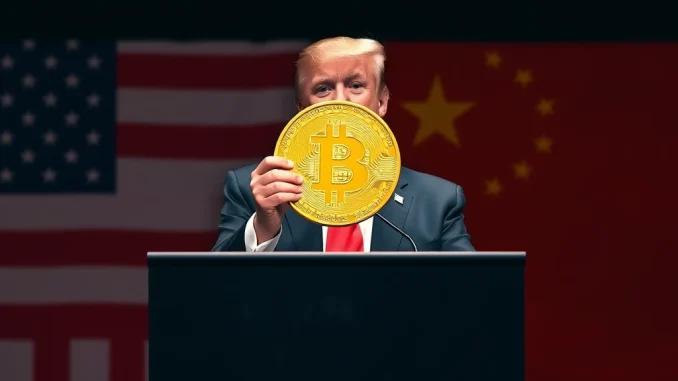
In a surprising turn for many, former U.S. President Donald Trump recently expressed a notable degree of support for cryptocurrency. His comments, made during an interview on NBC News’ Meet the Press, signal a shifting Political stance on crypto from a figure who has previously expressed skepticism. This development is particularly significant in the ongoing discussion around US crypto regulation and the nation’s competitive position globally.
Trump Crypto: Why the Crucial Backing Now?
Donald Trump’s remarks indicate a recognition of cryptocurrency’s growing importance. He stated, “I want crypto. I think crypto’s important because if we don’t do it, China’s going to. And it’s new, it’s very popular, it’s very hot.” This framing positions cryptocurrency not just as a financial asset, but as a strategic technology essential for national competitiveness.
His emphasis on the popularity and ‘hot’ nature of crypto suggests an awareness of its grassroots appeal and market momentum. This is a different tone compared to past criticisms, where he reportedly called crypto a “scam” or expressed concerns about its volatility and use in illicit activities. The shift highlights how the political landscape surrounding digital assets is evolving.
US Crypto Regulation: What’s at Stake?
The context for Trump’s comments includes a complex and often uncertain environment for US crypto regulation. Various government agencies have asserted jurisdiction, leading to a patchwork of rules and enforcement actions rather than a clear, unified framework. Proponents argue that this regulatory ambiguity hinders innovation and pushes crypto businesses overseas.
A clear regulatory approach could potentially foster domestic growth in the crypto sector, attracting investment and talent. Conversely, overly restrictive or unclear rules could stifle development, potentially causing the US to fall behind other nations that adopt more favorable stances.
Key areas of regulatory debate in the US include:
- Classification of digital assets (securities, commodities, etc.)
- Taxation of crypto transactions
- Rules for exchanges and custodians
- Consumer protection measures
- Integration with traditional finance
China Crypto Dominance: Is the Threat Real?
Trump explicitly linked his support for crypto to the potential for China crypto dominance if the U.S. doesn’t engage. While China has taken a strong stance against decentralized cryptocurrencies like Bitcoin, banning mining and trading, it has also been a leader in developing its own central bank digital currency (CBDC), the digital yuan.
China’s approach is less about fostering open, decentralized crypto markets and more about controlling digital payments and potentially challenging the dominance of the US dollar in international trade over the long term. Trump’s concern might stem from the broader technological and financial innovation race, where falling behind in any key digital sector could have economic and geopolitical consequences.
The comparison can be seen through different lenses:
| Aspect | U.S. Approach (Current) | China Approach |
|---|---|---|
| Decentralized Crypto (Bitcoin, etc.) | Uncertain regulation, ongoing debate | Outright ban on trading/mining |
| Central Bank Digital Currency (CBDC) | Research phase, no immediate plans for retail CBDC | Advanced pilot programs (Digital Yuan) |
| Innovation Focus | Private sector-led, seeking regulatory clarity | State-led (especially CBDC), tight control |
Trump’s comment suggests a view that the U.S. needs to be active in the broader crypto space, not just ignore or suppress it, to maintain its global standing against rivals like China.
The TRUMP Memecoin Price Puzzle and Personal Gain
The interview also touched upon the speculative world of memecoins, specifically the TRUMP-themed token (MAGA). The reporter asked if Trump was personally profiting from the token, which saw a significant spike in its TRUMP memecoin price recently, particularly after news of a gala dinner for top holders.
Trump directly denied any personal gain, stating, “I’m not profiting from anything.” This denial is important given the highly speculative nature of political memecoins, which often rise and fall based on news and endorsements related to the figure they represent. Such tokens raise questions about ethics, potential conflicts of interest, and market manipulation.
Memecoins like TRUMP are distinct from established cryptocurrencies like Bitcoin or Ethereum. They are often created as social experiments, jokes, or community-driven projects, with value largely based on hype and speculation rather than underlying technology or utility. Their association with political figures adds another layer of complexity and risk.
Political Stance on Crypto: What Does This Mean Going Forward?
Donald Trump’s seemingly more positive Political stance on crypto could have several implications, especially as the U.S. heads towards another election cycle. With a growing number of crypto holders and enthusiasts among the electorate, a favorable view from a major political figure could resonate with voters.
It might also put pressure on other politicians to clarify their positions on crypto and US crypto regulation. As the technology becomes more mainstream, ignoring it or maintaining an exclusively negative view may become less politically viable.
However, it’s important to note that a politician’s stated support doesn’t automatically translate into clear policy or regulation. The complexities of implementing effective and balanced crypto rules involve navigating various interests, technological challenges, and economic considerations.
In Summary: Donald Trump’s recent comments mark a significant moment in the intersection of politics and cryptocurrency. By endorsing crypto and framing it as crucial for the U.S. to avoid being overtaken by China, he has brought the debate over digital assets squarely into the political mainstream. While denying personal profit from the speculative TRUMP memecoin price, his remarks underscore the growing recognition of crypto’s importance and the urgent need for clarity on US crypto regulation to counter potential China crypto dominance. This evolving Political stance on crypto from prominent figures suggests that the future of digital assets will continue to be a key topic in policy discussions.



